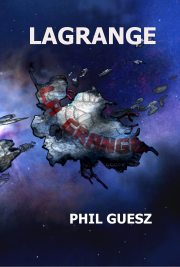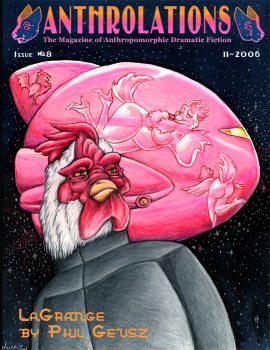Review: 'Lagrange', by Phil Geusz
 Lagrange is one of Phil Geusz’s slighter pieces. The novella appeared in the Sofawolf Press magazine Anthrolations #8, November 2006, and was reprinted in the online Furry magazine Anthro #25, September-October 2009. Now here it is as a separate booklet from Legion Publishing in hardcover, trade paperback, or Kindle editions, your choice.
Lagrange is one of Phil Geusz’s slighter pieces. The novella appeared in the Sofawolf Press magazine Anthrolations #8, November 2006, and was reprinted in the online Furry magazine Anthro #25, September-October 2009. Now here it is as a separate booklet from Legion Publishing in hardcover, trade paperback, or Kindle editions, your choice.
It may also be the only high-tech astronautical erotic comedy-drama that you ever encounter. Don’t miss it.
Legion Printing, January 2012, hardcover $5.99+$5 s&h (91 pages), trade paperback $3.99+$5 s&h, Kindle $2.99.
Lagrange is set during the early years of space travel and settlement, when permanent space stations have been constructed. Wikipedia says,
Lagrange point colonization is the colonization of the five equilibrium points in the orbit of a planet or its primary moon, called Lagrangian points. The most obvious such points for colonization are those in the Earth-Moon and in the Sun-Earth systems. Although it would generally take days or even weeks to reach these latter with current technology, it would be possible to generate energy from sunlight at them nearly continuously since they would, due to their considerable distance from Earth, be shaded from the Sun only seldom and then only shortly.
Lagrange habitat proponents argue that this is the obvious next step in space settlement, rather than trying to establish habitable colonies on the Moon or Mars.
The first 27 pages are setup, to establish both the physical parameters of Lagrange Station and its satellite stations, and the plight of the protagonist, Space Pod pilot Marvin Mackleschmidt. Lagrange is a working space station, with a permanent construction staff who are always expanding and enlarging it, a wealthy tourist trade, and the workers of the space Mining Fleet who bring back huge “snowballs” of water and methane from the Kuiper Belt for resource-starved Earth.
The miners and other spacemen work hard, and they need their relaxation. Rich businessman Beauregard Montclair conceived and built the Henhouse, the first space bordello, named after a notorious bordello in Texas (real name: the Chicken Ranch, on which the 1978 Broadway musical The Best Little Whorehouse in Texas was based); illegal in Lagrange but operating just outside it.
Prostitution was illegal in Lagrange Station, but the Lagrange Board of Aldermen was only empowered to regulate a sphere of space a hundred clicks in radius. The Henhouse orbited precisely one hundred and one kilometers out at all times. Part of my job was making damn certain that we never, ever, drifted any closer. As things stood, the Aldermen could only stare at us spinning outside their portholes and fume impotently as their more adventurous sprits [sic.] spent every spare credit just beyond their legal grasp. Beauregard was becoming very rich, very quickly. (pgs. 8-9)
 Beauregard believes in flamboyant advertising. He has named the space pod that takes the clientele back and forth between Lagrange and the Henhouse officially the Aphrodite, but everyone calls it the Pussy Pod. He has had his entire staff morphed appropriately; there are a whip-cracking, stiletto-heeled Dominatrix, a Marilyn Monroe, “an ex-male with seven fully functional vaginas inset into various parts of her anatomy” (p. 23), fox and rabbit and sheep girls, and others. And Marvin, the narrator, as “the Pussy Pilot” of the Aphrodite, the first of the Henhouse’s staff that the public will meet, has become a six-foot-tall chicken man.
Beauregard believes in flamboyant advertising. He has named the space pod that takes the clientele back and forth between Lagrange and the Henhouse officially the Aphrodite, but everyone calls it the Pussy Pod. He has had his entire staff morphed appropriately; there are a whip-cracking, stiletto-heeled Dominatrix, a Marilyn Monroe, “an ex-male with seven fully functional vaginas inset into various parts of her anatomy” (p. 23), fox and rabbit and sheep girls, and others. And Marvin, the narrator, as “the Pussy Pilot” of the Aphrodite, the first of the Henhouse’s staff that the public will meet, has become a six-foot-tall chicken man.
Marvin is deeply embarrassed by this. He had wanted to become a serious, experienced space pilot, and had gotten top grades in space piloting. But due to economic reasons, the only job in space that he could find was the one that required him to become a chicken man. He is resigned to his fate.
Until page 27, when disaster strikes! A massive explosion aboard the Lagrange kills thousands and sets the Henhouse spinning loose with catastrophic structural damage. Marvin is forced to improvise repairs with little to work with besides sex toys (neon-bright dildos to plug air leaks), with the help of the Dragon (dominatrix) and the willing but untrained exotic girls. There is a riot that he must put down, caused by the Henhouse’s clientele becoming intoxicated by an overdose of airborne aphrodisiacs. Marvin learns that the Lagrange is being evacuated by its own survivors, leaving the Henhouse to die unless he can get its 300 survivors back to it in time.
The 60+-page space disaster is solemnly dramatic. At the same time, it is impossible to take entirely seriously because its astronaut hero is a giant chicken, using exaggerated sex toys for his tools. Lagrange would be worth reading if only for its sheer outrageousness. The fact that it is imaginative, well-written, and a great blend of comedy and drama makes it a story not to be missed.
About the author
Fred Patten — read stories — contact (login required)a retired former librarian from North Hollywood, California, interested in general anthropomorphics
Comments
Post new comment